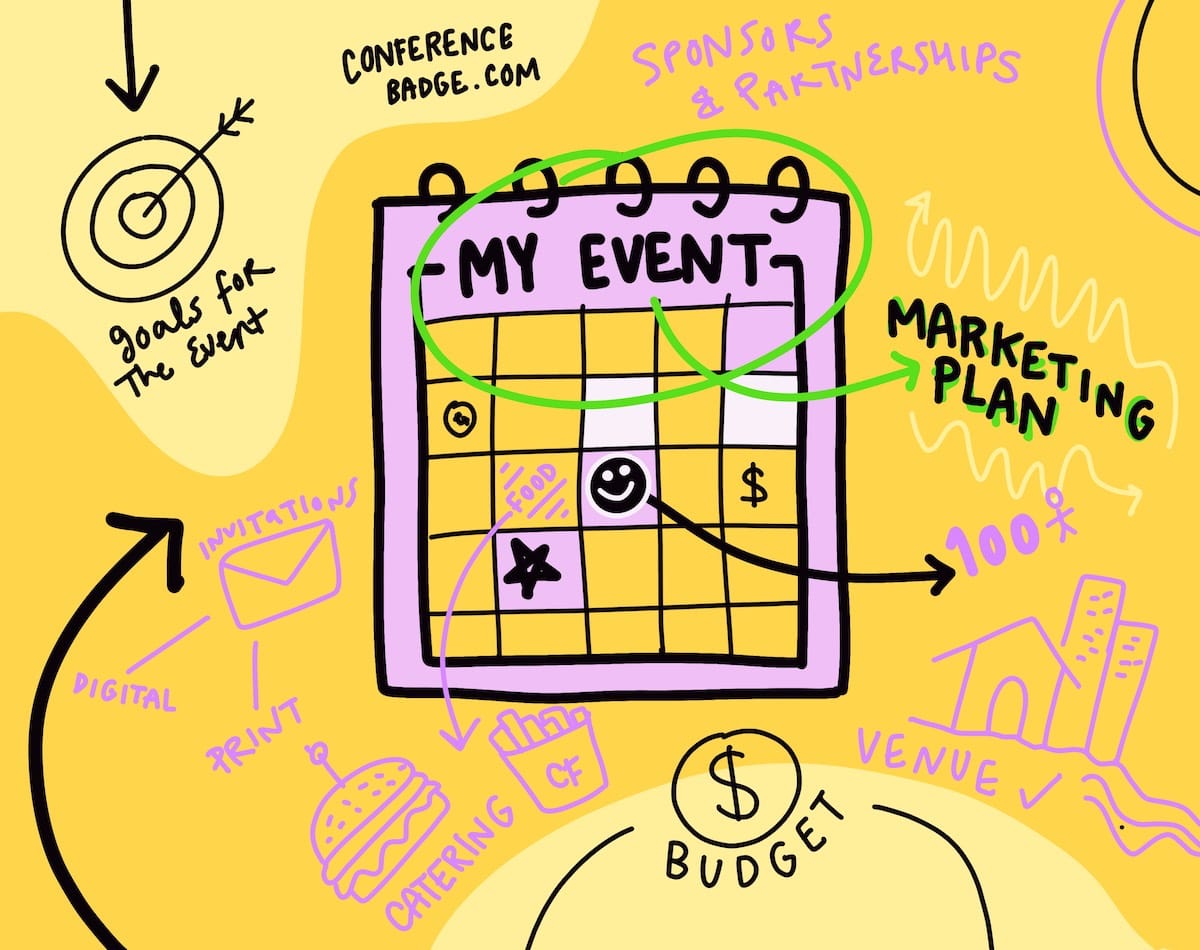Why An Event Marketing Plan Is Crucial For Success

Artwork by Mónica Alexis
In the dynamic world of event planning, success doesn't happen by chance. It results from effective planning, execution, and creativity, and one of the cornerstones of achieving a successful event lies in event marketing. Crafting an effective event marketing plan is like designing a roadmap that guides you from the concept to the actual event, ensuring your next event meets and exceeds its objectives.
In this article, we'll dive into the impact of an event marketing plan on your success and explore a step-by-step guide to creating one.
The Significance of an Event Marketing Plan
Picture this: you've prepared every detail of your upcoming event, from the venue and speakers to the catering and logistics. However, without a well-thought-out marketing plan, you're essentially launching what could be an extraordinary event into the void. Why? Because an event marketing plan is an absolute necessity.
Here's why:
Building Anticipation and Awareness: A successful event starts with creating a buzz. An event marketing strategy helps you build anticipation among your target audience by strategically disseminating information about your event through various channels, whether social media marketing, event website, email campaigns, or marketing campaigns.
Attracting the Right Audience: Not all attendees are created equal. An effective marketing plan allows you to identify your target audience and tailor your messaging to resonate with their interests and needs. You can tailor your event promotion to that audience, targeting outreach and performing follow-ups to the right people.
Establishing Brand Authority: Your event isn't just a one-time affair; it's an opportunity to strengthen your brand's presence and authority in your industry. A well-structured marketing plan lets you showcase your expertise, values, and unique offerings, positioning your future event as a must-attend gathering with a lasting impact.
Securing Sponsors and Partnerships: Sponsors and partners play a vital role in enhancing your event's scale and scope. An event marketing plan adds credibility to your event, making it an attractive proposition for potential sponsors and partners.
What should an event marketing plan include
An effective event marketing plan should be comprehensive and well-structured, guiding your efforts from pre-event promotion to post-event follow-up.
Executive Summary: A brief overview of the event with the event details, its objectives, and the target audience. Summary of key strategies and tactics to be employed.
Event Goals and Objectives: Clearly define SMART goals for the event. Outline the objectives you aim to achieve through the event, such as attendance numbers, lead generation, revenue targets, specific metrics, etc.
Target Audience: A detailed description of your target audience, including demographics, interests, pain points, and behaviors. Creation of attendee personas to help tailor marketing messages and strategies.
Branding and Messaging: Define the event's brand identity, including logos, colors, and tone of voice. Develop consistent messaging that reflects the event's value proposition and resonates with the target audience.
Marketing Channels and Tactics: Identify the marketing channels, such as social media, press releases, email marketing, content marketing, and advertising. Specify the tactics within each channel, such as creating engaging social media posts, sending personalized email campaigns, producing valuable content, and more.
Budget Allocation: Allocate the marketing budget for each incentive and channel. Consider costs for advertising, content creation, design, printing, technology tools, and any other expenses related to marketing efforts.
Timeline and Milestones: Create a detailed timeline that outlines the tasks, deadlines, and milestones leading up to the event. Include pre-event, event-day, and post-event marketing activities.
Promotional Strategies: Detail how you'll create anticipation and generate buzz leading up to the event. Outline strategies for engaging attendees through contests, early bird event registration, giveaways, teasers, and countdowns.
Event Content Marketing Plan: Develop a content strategy that includes blog posts, videos, webinars, podcasts, and other content relevant to the event. Plan content creation, distribution, and promotion to educate and engage your audience.
Partnerships and Collaborations: Identify potential partners, stakeholders, sponsorships, and influencers to collaborate with for cross-promotion. Detail how these collaborations will be leveraged for increased exposure.
Measurement and Analytics: Define the key performance indicators (KPIs) you'll use to measure the success of your marketing efforts. Specify the marketing tools you'll use for tracking and analytics, such as Google Analytics, social media insights, etc.
Post-Event Activities: Describe how you'll engage attendees after the event to maintain their interest and gather feedback. Plan for post-event surveys, thank-you emails, and sharing event highlights.
Note: Remember that your event marketing plan is a living document. It should be regularly reviewed and adjusted based on feedback, data insights, and changing circumstances.
Creating an Event Marketing Plan: Step-by-Step Guide
Creating a successful event marketing plan involves multiple steps. Let's explore them in more detail:
Step 1: Set Clear Objectives
Are you aiming to drive ticket sales, gather leads, or enhance industry visibility?
Each objective will shape your marketing strategies differently.
Before diving into the details of your marketing plan, it's crucial to establish clear and measurable goals for your event. Whether you aim to increase attendance by a certain percentage, or enhance brand awareness, defining your objectives provides direction and purpose to your pre-event marketing efforts.
Step 2: Identify Your Target Audience
Understanding your audience is crucial in event management. Research and gather data to pinpoint your event attendees' demographics, preferences, and pain points. This knowledge helps you tailor your messaging and promotional strategies to resonate with their needs.
Step 3: Develop Your Brand Identity and Message
Consistency is key in event branding. Develop a compelling brand identity encompassing your event's theme, logo, colors, and tone of voice. Your messaging should reflect your event's value and unique selling point.
Step 4: Select Your Marketing Channels
With many marketing channels, selecting the ones that best align with your target audience and objectives is crucial. Social media posts, email marketing, content marketing, influencer collaborations, personal outreach, and even traditional media channels should be chosen strategically to maximize your reach and engagement.
Step 5: Allocate Budget and Resources
A well-allocated budget ensures that your marketing strategies are executed effectively. Determine how much you will spend on each marketing activity, from digital ads to event collateral. Balancing your budget across different channels and tactics prevents overspending and allows you to invest wisely in activities that yield the best results.
Step 6: Create a Marketing Timeline
Time is a valuable asset in event marketing. Craft a detailed timeline outlining the various marketing activities leading up to the event, during, and post-event. Assign specific deadlines for each task, ensuring that you have some extra time for strategy execution, content creation, and audience engagement.
Step 7: Create the event marketing plan
Creating an event marketing plan using a template can help streamline the process and ensure you cover all essential aspects. Find an event marketing plan template that suits your needs. You can search for templates online, use software like Microsoft Word or Google Docs, or explore event management tools with built-in templates.
Bonus: Leveraging Conference Badge for Event Success
As we've explored the multiple aspects of an event marketing plan, it's important to note how Conference Badge's custom event badge tool can easily integrate with your overall strategy. Providing attendees with personalized badges enhances their engagement with your event and creates networking opportunities. Customize each badge, add attendees’ names directly from Eventbrite or Excel, and design specific designs for various types of attendees. Start today!

As we've explored in this article, the significance of an event marketing plan cannot be overstated. It is the driving force behind building anticipation, attracting the right audience, maximizing engagement, establishing brand authority, and forging valuable partnerships.
Happy event planning!
